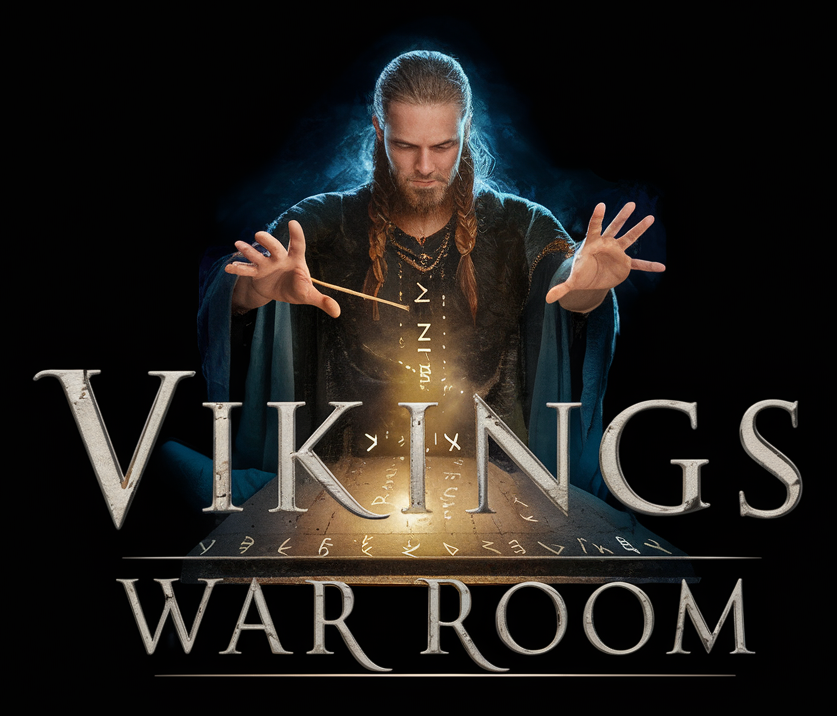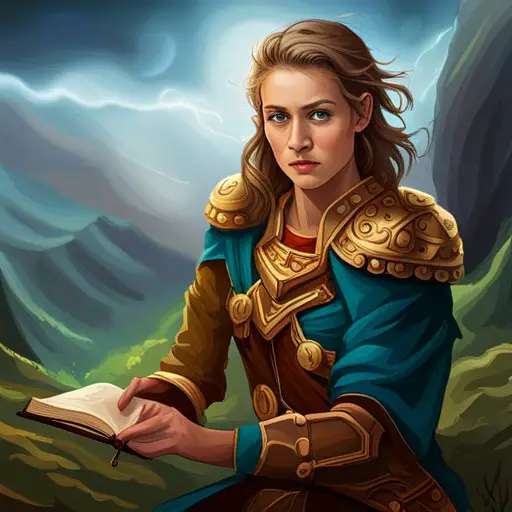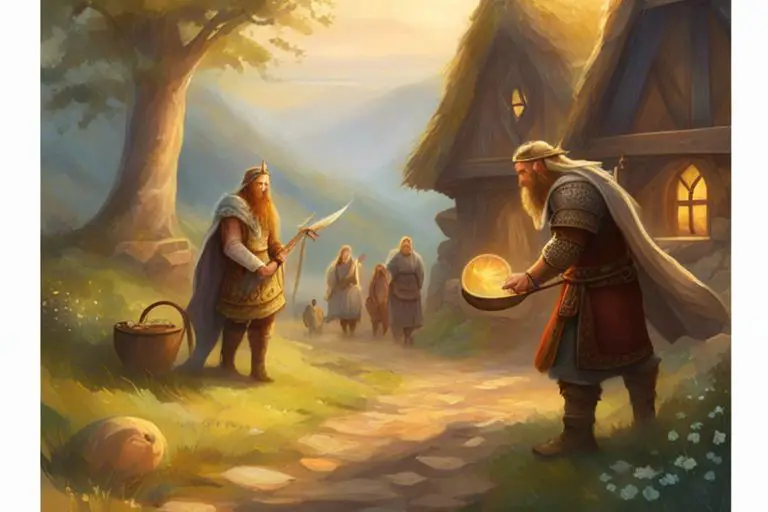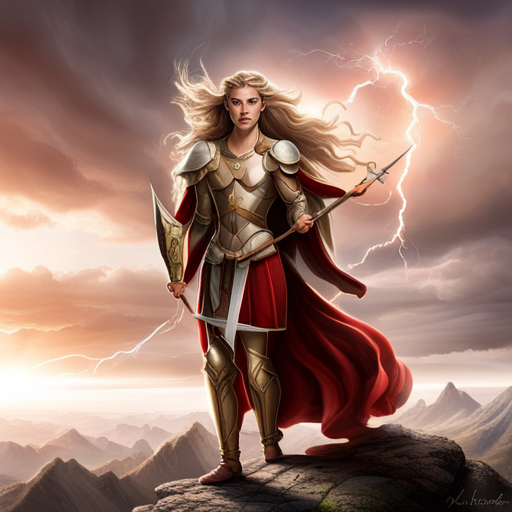As someone who has always been fascinated by mythology and folklore, Norse mythology has always held a special place in my heart. The tales of Odin, Thor, and Loki and their epic battles and adventures have captivated me since childhood.
But as I grew older, I realized that there was so much more to this rich and complex mythology than I had ever imagined.
That’s why I set out to explore the best books on Norse mythology, in order to unlock its secrets and gain a deeper understanding of this ancient culture. Whether you’re a die-hard fan of Norse mythology or a newcomer to this fascinating world, these books are sure to offer insights, inspiration, and a sense of belonging to a community of people who share your passion for the myths and legends of the Vikings.
The Poetic Edda
The Poetic Edda takes readers on a journey through the vivid and enchanting world of ancient Norse tales. As a lover of mythology, I was immediately drawn to this collection of poems that tells the stories of gods, heroes, and creatures from Norse mythology.
The language is rich and beautiful, and the tales themselves are both thrilling and poignant. One of the things that stands out about The Poetic Edda is the way it captures the essence of Norse culture and worldview. The stories are full of fierce battles, tragic love stories, and profound wisdom.
They offer a glimpse into a world that was both harsh and beautiful, where honor, loyalty, and courage were highly valued. Reading this book, I felt like I was tapping into something ancient and powerful, something that has resonated with people for centuries.
It’s a truly remarkable work, and one that I highly recommend to anyone interested in mythology or history.
And speaking of modern retellings of Norse mythology, the next book on my list is Norse Mythology by Neil Gaiman.
Norse Mythology by Neil Gaiman
If you’re looking for an engaging and accessible read that brings the gods and creatures of Norse tales to life, Neil Gaiman’s Norse Mythology is the book for you – it’s like a fire crackling with the stories of Thor, Loki, and Odin.
Gaiman’s retelling of the Norse myths is a perfect blend of humor, drama, and adventure, making it a perfect choice for readers of all ages. He breathes new life into these ancient stories, capturing the spirit of the Norse gods and their world.
Gaiman’s writing style is simple yet powerful, making the tales of Norse mythology accessible to anyone who picks up the book. If you’re looking to dive into the world of Norse mythology, Gaiman’s Norse Mythology is the perfect place to start.
The Prose Edda
You’ll feel like you’re sitting by a campfire as you read through the Prose Edda, with its vivid descriptions of the gods and their epic adventures. Written in the 13th century by the Icelandic scholar Snorri Sturluson, this book is a comprehensive collection of Norse myths, legends, and beliefs.
It not only covers the creation of the world and the gods, but also the end of the world, known as Ragnarok, and everything in between.
The Prose Edda is divided into three parts. The first is called Gylfaginning, which means ‘the deluding of Gylfi,’ and is a dialogue between a king named Gylfi and a group of gods who teach him about Norse mythology.
The second part, Skáldskaparmál, is a guide for poets on how to compose poems about the gods and heroes.
The third part, Háttatal, is a collection of poems that exemplify different forms of Norse poetry.
Overall, the Prose Edda is a fascinating read for anyone interested in Norse mythology and the ancient beliefs of the Viking people.
As you finish the Prose Edda, you’ll want to dive into another classic book on Norse mythology: The Saga of the Volsungs. This epic tale follows the adventures of Sigurd, a hero who slays a dragon and gains immense wealth and power.
The story is filled with magic, battles, and tragedy, and is a must-read for anyone interested in the heroic tales of Norse mythology.
So, grab a copy of The Saga of the Volsungs and get ready for an epic adventure!
The Saga of the Volsungs
Once you’ve finished the Prose Edda, it’s time to delve into the epic tale of the Volsungs and join Sigurd on his journey filled with magic, battles, and tragedy.
The Saga of the Volsungs is one of the most famous Norse sagas and is a must-read for anyone interested in Norse mythology.
The story follows Sigurd, a hero with a tragic fate, as he battles dragons, falls in love, and ultimately meets his demise.
It’s a captivating and heartbreaking story that showcases the power of fate and the consequences of actions.
If you’re looking for a book that will transport you to another world and leave you feeling a sense of awe, then The Saga of the Volsungs is the perfect choice.

The Norse Myths by Kevin Crossley-Holland
The Norse Myths by Kevin Crossley-Holland offers a comprehensive compilation of Norse tales with over 30 different stories, making it the perfect choice for readers who crave a deeper understanding of Norse lore.
I found this book to be an engaging and insightful read. The author’s attention to detail and the way he weaves together various stories to create a cohesive narrative impressed me. Crossley-Holland also provides helpful background information and notes on each tale, which adds to the reader’s understanding and appreciation of Norse mythology as a whole.
Overall, The Norse Myths is a must-read for anyone interested in delving deeper into the fascinating world of Norse mythology.
Frequently Asked Questions
What is the origin of Norse mythology and how did it develop over time?
The origin of Norse mythology can be traced back to the pre-Christian era of Scandinavia. As a polytheistic religion, the Norse people worshipped a pantheon of gods and goddesses who were believed to possess great power and influence over the natural world.
Over time, these stories and myths were passed down through oral tradition, eventually being recorded in written form in the 13th century in the form of the Prose Edda and the Poetic Edda.
As Norse society evolved and Christianity began to take hold, the popularity and practice of Norse mythology dwindled, but its legacy and impact can still be felt in modern culture and literature.
Have you ever wondered what daily life was like for ancient Scandinavians who believed in Norse mythology? It played a significant role in their lives and influenced their decisions, beliefs, and values.
From birth to death, Norse mythology was intertwined with their daily routines, rituals, and celebrations. It provided explanations for natural phenomena, such as weather patterns, and guided their moral compass through stories of gods and goddesses.
It was also a source of entertainment, with epic tales of battles and adventures. Understanding the importance of Norse mythology in the daily lives of ancient Scandinavians allows us to gain a deeper appreciation for their culture and way of life.
How did Norse mythology influence other cultures and religions?
As I’ve delved deeper into Norse mythology, I’ve been fascinated by the way it has influenced other cultures and religions.
For example, the Vikings’ travels and raids spread the stories of their gods and heroes throughout Europe, and some of these stories even made their way into the works of authors like J.R.R. Tolkien.
Additionally, some scholars believe that certain elements of Christianity were influenced by Norse mythology, such as the idea of a single all-powerful god and the concept of a final battle between good and evil.
It’s amazing to think about how these ancient stories have had such a lasting impact on the world, and it makes me even more excited to continue learning about them.
What are some lesser-known gods or stories in Norse mythology?
I recently discovered some lesser-known gods and stories in Norse mythology that were fascinating to me.
One of them is the goddess Eir, who is associated with healing and medicine.
Another lesser-known god is Forseti, who presides over justice and reconciliation.
I also came across the story of the giantess Gerd and the god Frey, which is a tale of love and sacrifice.
Learning about these hidden gems in Norse mythology made me realize how vast and diverse the pantheon truly is.
It’s exciting to think about all the other stories and gods that are waiting to be discovered.
How has the interpretation and understanding of Norse mythology changed over time?
As I’ve delved deeper into the world of Norse mythology, I’ve learned that our understanding and interpretation of these ancient stories has evolved over time.
What we know about the gods and their tales has been shaped by a variety of factors, from the way the stories were originally recorded to how they’ve been handed down through generations.
As new discoveries are made and new perspectives are brought to the table, our understanding of Norse mythology continues to evolve.
It’s fascinating to see how these stories have endured for centuries and how they continue to captivate and inspire us today.
Conclusion
In closing, exploring Norse mythology through literature is like embarking on a journey through the Nine Realms. Each book is like a different path, leading to new discoveries and revelations about the ancient gods and their stories.
The Poetic Edda is like the main road, taking you through the heart of the myths. Norse Mythology by Neil Gaiman is like a scenic route, with twists and turns that leave you breathless.
The Prose Edda is like a winding path, full of hidden treasures. The Saga of the Volsungs is like a rugged trail, leading to the heart of heroism.
And The Norse Myths by Kevin Crossley-Holland is like an enchanted forest, full of wonder and magic. No matter which path you choose, the journey is sure to be a memorable one.
You’ll encounter fierce battles, cunning tricksters, and powerful deities. You’ll witness the creation of the world and the end of days. And you’ll come away with a deeper understanding of the rich and complex mythology of the Norse people.
So pack your bags and set out on your own adventure through the pages of these books. Who knows what secrets you might uncover?





